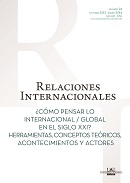Keywords:
Historical turn , practice turn , methodology , ethics, interdisciplinarity, history, process, change, Continuity, Critical Theories, Analysis CathegoriesCopyright (c) 2013 Marta IÑIGUEZ DE HEREDIA

This work is licensed under a Creative Commons Attribution-NonCommercial-NoDerivatives 4.0 International License.
Abstract
With the historical and the practice turns in International Relations as a reference, this article analyses the concepts of “practice” and “process”. In both turns these concepts have satisfied ethical and methodological concerns relating to the study of patterns of action, continuity and change; to the need of linking the micro and macro levels; and to the use of history as part of the theoretical explanation. Moreover, both turns have claimed that the study of processes and practices is part of a more rigorous, ethical, and even emancipatory research. However, the fact that two seemingly different intellectual schools have been formed – historical and practice – presses us to inquire not only about their intellectual heritage, but also about what these categories bring to study of International Relations. In order to answer these questions, this article traces intellectually and empirically the work of Michel De Certeau, Norbert Elias, and that on peace processes within the liberal peace debates. The article concludes with an important contribution: Even though the study of practices and processes promises to resolve methodological and ethical questions within different theoretical frameworks, the interdisciplinary and ontological concerns of International Relations, as a field, are not satisfied by the use of particular categories but by the dialectic that exists between methodology, theory, and the argument that leads the research.





